PUBLICATIONS
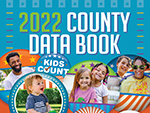 The 2022 Kentucky KIDS COUNT County Data Book features the latest data on 16 measures of child well-being, showing whether outcomes for children across the Commonwealth have improved, worsened, or stayed the same over a five-year period.
The 2022 Kentucky KIDS COUNT County Data Book features the latest data on 16 measures of child well-being, showing whether outcomes for children across the Commonwealth have improved, worsened, or stayed the same over a five-year period.
VIEW NOW
 The 31st edition of the Kentucky KIDS COUNT County Data Book features the latest data on 17 measures of child well-being, showing how outcomes for children across the commonwealth have changed over a five-year period. This data book focuses on advancing race equity, with an examination of racial disparities and the longstanding systemic barriers that contributed to them, alongside policy and practice solutions to address these disparities.
The 31st edition of the Kentucky KIDS COUNT County Data Book features the latest data on 17 measures of child well-being, showing how outcomes for children across the commonwealth have changed over a five-year period. This data book focuses on advancing race equity, with an examination of racial disparities and the longstanding systemic barriers that contributed to them, alongside policy and practice solutions to address these disparities.
VIEW NOW
 This issue brief highlights the prevalence of parental incarceration in Kentucky, the impact maternal incarceration has on children, and the state policy and practice changes that could hold parents accountable for their actions in ways that allow them to continue to care for their children and become successful contributors to society.
This issue brief highlights the prevalence of parental incarceration in Kentucky, the impact maternal incarceration has on children, and the state policy and practice changes that could hold parents accountable for their actions in ways that allow them to continue to care for their children and become successful contributors to society.
 The 30th edition of the Kentucky KIDS COUNT County Data Book features the latest data on 17 measures of child well-being, showing how outcomes for children across the commonwealth have changed over a five-year period. Though this data is not reflective of conditions during the COVID-19 crisis, it does indicate pre-existing barriers and areas of needed improvement. The opening essay examines the impacts of the dual pandemics of COVID-19 and systemic racial injustice on children and families with data disaggregated by race/ethnicity. VIEW NOW
The 30th edition of the Kentucky KIDS COUNT County Data Book features the latest data on 17 measures of child well-being, showing how outcomes for children across the commonwealth have changed over a five-year period. Though this data is not reflective of conditions during the COVID-19 crisis, it does indicate pre-existing barriers and areas of needed improvement. The opening essay examines the impacts of the dual pandemics of COVID-19 and systemic racial injustice on children and families with data disaggregated by race/ethnicity. VIEW NOW
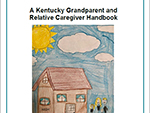 In A Kentucky Grandparent and Relative Caregiver Handbook, caregivers will find information on the basics of kinship care and the court process, tips for engaging with birth parents and navigating the complex child welfare system, and resources to help the vulnerable children in their care grow and thrive.
In A Kentucky Grandparent and Relative Caregiver Handbook, caregivers will find information on the basics of kinship care and the court process, tips for engaging with birth parents and navigating the complex child welfare system, and resources to help the vulnerable children in their care grow and thrive.
 The 2019 Kentucky KIDS COUNT County Data Book offers the latest data on 17 measures of child well-being, showing whether outcomes for children across the commonwealth have improved, worsened, or stayed the same over a five-year period. The opening essay explores how another undercount of young children in the 2020 census would negatively affect funding provided to our state and communities, reduce the reliability of data on child well-being, and could diminish political representation. VIEW NOW
The 2019 Kentucky KIDS COUNT County Data Book offers the latest data on 17 measures of child well-being, showing whether outcomes for children across the commonwealth have improved, worsened, or stayed the same over a five-year period. The opening essay explores how another undercount of young children in the 2020 census would negatively affect funding provided to our state and communities, reduce the reliability of data on child well-being, and could diminish political representation. VIEW NOW
 The 2018 County Data Book offers the latest data on 17 measures of child well-being, showing whether outcomes for children across the commonwealth have improved, worsened, or stayed the same over a five-year period. The opening essay takes a deep dive into the impact of trauma, specifically abuse and neglect, on children’s short- and long-term health and well-being. VIEW NOW
The 2018 County Data Book offers the latest data on 17 measures of child well-being, showing whether outcomes for children across the commonwealth have improved, worsened, or stayed the same over a five-year period. The opening essay takes a deep dive into the impact of trauma, specifically abuse and neglect, on children’s short- and long-term health and well-being. VIEW NOW
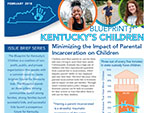 Children need their parents to care for them and earn a living to meet their basic needs. Unfortunately, Kentucky has a high rate of children who have experienced separation from a parent due to incarceration, which impedes parents’ ability to stay employed and raise their kids. Through smart criminal justice policy changes, more Kentucky parents can be held accountable for their actions in ways that allow them to still care for their children. VIEW NOW
Children need their parents to care for them and earn a living to meet their basic needs. Unfortunately, Kentucky has a high rate of children who have experienced separation from a parent due to incarceration, which impedes parents’ ability to stay employed and raise their kids. Through smart criminal justice policy changes, more Kentucky parents can be held accountable for their actions in ways that allow them to still care for their children. VIEW NOW
 The 2017 County Data Book provides data on 17 measures of child well-being, showing whether outcomes for children have improved, worsened, or stayed the same over a five-year period. It also calculates how many children would be impacted if Kentucky was able to make just a 10 percent improvement for each measure.
The 2017 County Data Book provides data on 17 measures of child well-being, showing whether outcomes for children have improved, worsened, or stayed the same over a five-year period. It also calculates how many children would be impacted if Kentucky was able to make just a 10 percent improvement for each measure.
 All children deserve to breathe clean air and be healthy, yet approximately 69 percent of Kentucky’s children live in a community that does not offer them strong protections from secondhand tobacco smoke in workplaces and other enclosed public places. Clearing the Air for All Kentucky Children explains how smoke-free policies in workplaces and public places can protect babies, children, and teens. VIEW NOW
All children deserve to breathe clean air and be healthy, yet approximately 69 percent of Kentucky’s children live in a community that does not offer them strong protections from secondhand tobacco smoke in workplaces and other enclosed public places. Clearing the Air for All Kentucky Children explains how smoke-free policies in workplaces and public places can protect babies, children, and teens. VIEW NOW
 The 2014 County Data Book focuses on key state and county-level measures of child well-being. It opens with an essay on adverse childhood experiences and offers recommendations to prevent and help kids recover from these experiences so they can thrive as adults.
The 2014 County Data Book focuses on key state and county-level measures of child well-being. It opens with an essay on adverse childhood experiences and offers recommendations to prevent and help kids recover from these experiences so they can thrive as adults.
 Integrated care leads to better health outcomes for Kentucky’s children and their families. It addresses health care needs using a range of strategies and resources in a variety of settings, promoting increased access to care and to higher-quality care.
Integrated care leads to better health outcomes for Kentucky’s children and their families. It addresses health care needs using a range of strategies and resources in a variety of settings, promoting increased access to care and to higher-quality care.
 This report highlights the key role early childhood plays in lifetime success; outlines the critical components of strong early childhood experiences; reviews how Kentucky is working to provide young children a solid foundation; and identifies additional opportunities for Kentucky to provide every child from birth through age eight a chance to reach their full potential. VIEW NOW
This report highlights the key role early childhood plays in lifetime success; outlines the critical components of strong early childhood experiences; reviews how Kentucky is working to provide young children a solid foundation; and identifies additional opportunities for Kentucky to provide every child from birth through age eight a chance to reach their full potential. VIEW NOW
 The 2013 County Data Book focuses on key state and county-level measures of child well-being. It opens with an essay on how to create a Kentucky where all children succeed.
The 2013 County Data Book focuses on key state and county-level measures of child well-being. It opens with an essay on how to create a Kentucky where all children succeed.
 Kinship care is an extremely valuable alternative to traditional foster care that allows children to retain strong familial bonds when children cannot stay in their homes with their parents. This issue brief summarizes the findings of a series of focus groups, interviews, and surveys conducted with kinship caregivers and support providers and offers recommendations for increasing supports for kinship families. VIEW NOW
Kinship care is an extremely valuable alternative to traditional foster care that allows children to retain strong familial bonds when children cannot stay in their homes with their parents. This issue brief summarizes the findings of a series of focus groups, interviews, and surveys conducted with kinship caregivers and support providers and offers recommendations for increasing supports for kinship families. VIEW NOW
 The Jefferson County KIDS COUNT Data Book published in 2013 provides data on children in Metro Louisville at the Council District level. This micro level data can help neighborhoods in Louisville look at unique issues impacting children in various parts of the city.
The Jefferson County KIDS COUNT Data Book published in 2013 provides data on children in Metro Louisville at the Council District level. This micro level data can help neighborhoods in Louisville look at unique issues impacting children in various parts of the city.
 All children, especially those living in low-income and vulnerable families need access to affordable health care. Providing affordable health coverage for parents is one proven way to improve overall family health and reduce the number of uninsured children.
All children, especially those living in low-income and vulnerable families need access to affordable health care. Providing affordable health coverage for parents is one proven way to improve overall family health and reduce the number of uninsured children.
 The 2012 County Data Book focuses on key state, county, and district level measures of education. It opens with an essay on how to strengthen alternative education programs.
The 2012 County Data Book focuses on key state, county, and district level measures of education. It opens with an essay on how to strengthen alternative education programs.
Sharing School Facilities: How Collaboration Can Increase Physical Activity in Communities, May 2012
 Shared-use allows spaces such as gymnasiums, tracks, cafeterias, athletic fields and other school facilities to be used for recreation by community members of all ages. This report outlines the current landscape of shared-use agreements and explains the challenges and opportunities for opening more shared-use facilities in communities across Kentucky.
Shared-use allows spaces such as gymnasiums, tracks, cafeterias, athletic fields and other school facilities to be used for recreation by community members of all ages. This report outlines the current landscape of shared-use agreements and explains the challenges and opportunities for opening more shared-use facilities in communities across Kentucky.
 Youth incarcerated for status offenses, which are acts defined as illegal only because they are committed by people who are under 18 years of age, face greater risk of poor education, work, and health outcomes, as well as future incarceration. This issue brief provides data on youth incarceration for status offenses and provides recommendations for more efficient and effective alternatives to incarceration. VIEW NOW
Youth incarcerated for status offenses, which are acts defined as illegal only because they are committed by people who are under 18 years of age, face greater risk of poor education, work, and health outcomes, as well as future incarceration. This issue brief provides data on youth incarceration for status offenses and provides recommendations for more efficient and effective alternatives to incarceration. VIEW NOW
 The 2011 County Data Book focuses on key state and county-level measures of children’s health. It opens with an essay on how to improve the oral health of Kentucky families.
The 2011 County Data Book focuses on key state and county-level measures of children’s health. It opens with an essay on how to improve the oral health of Kentucky families.
 A learning environment that is safe and nurturing is necessary for all children to grow and thrive in school. For children in schools that use corporal punishment, or physical force, as a form of discipline, the classroom can become a threatening environment.
A learning environment that is safe and nurturing is necessary for all children to grow and thrive in school. For children in schools that use corporal punishment, or physical force, as a form of discipline, the classroom can become a threatening environment.
 While secure detention may be appropriate for violent offenses, it is rarely an appropriate or effective option for addressing status offenses, which are offenses that are illegal if committed by someone under age 18. The Reclaiming Futures model has been developed to identify the critical stages for implementing a successful plan for youth who have been or are at risk of being charged with a status offense. VIEW NOW
While secure detention may be appropriate for violent offenses, it is rarely an appropriate or effective option for addressing status offenses, which are offenses that are illegal if committed by someone under age 18. The Reclaiming Futures model has been developed to identify the critical stages for implementing a successful plan for youth who have been or are at risk of being charged with a status offense. VIEW NOW
 Complete streets are designed to accommodate everyone using the road, including pedestrians, bicyclists, motorists, and public transportation users of all ages and abilities. This issue brief explains how complete streets increase safety and improve health and makes recommendations for more Kentucky communities to incorporate complete streets.
Complete streets are designed to accommodate everyone using the road, including pedestrians, bicyclists, motorists, and public transportation users of all ages and abilities. This issue brief explains how complete streets increase safety and improve health and makes recommendations for more Kentucky communities to incorporate complete streets.
 A Picture of Health: A Report of Kentucky School Districts’ Health Services presents the findings of a study of school health services offered in Kentucky school districts during the 2008-2009 school year and offers highlights of promising practices across the state. Study topics included school health services funding, school health services offered, and types of school health providers. VIEW NOW
A Picture of Health: A Report of Kentucky School Districts’ Health Services presents the findings of a study of school health services offered in Kentucky school districts during the 2008-2009 school year and offers highlights of promising practices across the state. Study topics included school health services funding, school health services offered, and types of school health providers. VIEW NOW
 All young people need a strong education to succeed in today’s economy, and graduating from high school is more critical than ever before. Failing to graduate high school has long-term negative consequences for the individual and for society. This brief focuses on prevention of high school dropout and strategies for improving the state’s high school graduation rate. VIEW NOW
All young people need a strong education to succeed in today’s economy, and graduating from high school is more critical than ever before. Failing to graduate high school has long-term negative consequences for the individual and for society. This brief focuses on prevention of high school dropout and strategies for improving the state’s high school graduation rate. VIEW NOW
 The 2010 County Data Book focuses on key state and county-level measures of economic well-being. It opens with an essay on how to increase access to work supports for Kentucky families.
The 2010 County Data Book focuses on key state and county-level measures of economic well-being. It opens with an essay on how to increase access to work supports for Kentucky families.
 All children need a safe environment and caring adults to thrive. This brief focuses on prevention of out-of-home placement for children who have been abused by ensuring that family preservation services and family reunification services are available.
All children need a safe environment and caring adults to thrive. This brief focuses on prevention of out-of-home placement for children who have been abused by ensuring that family preservation services and family reunification services are available.
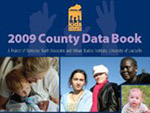 The 2009 County Data Book focuses on key state and county level measures of safety. It opens with an essay on the need for better collaboration between the juvenile justice and child welfare systems.
The 2009 County Data Book focuses on key state and county level measures of safety. It opens with an essay on the need for better collaboration between the juvenile justice and child welfare systems.
 Though unintentional, the system of juvenile justice results in different vulnerabilities, treatment, and outcomes for youth of color compared to white youth, even when they have engaged in the very same behaviors. This issue brief includes data that shows that youth of color are clearly over represented at some of the key decision-making points within Kentucky’s juvenile justice system and provides recommendations for eliminating these disparities. VIEW NOW
Though unintentional, the system of juvenile justice results in different vulnerabilities, treatment, and outcomes for youth of color compared to white youth, even when they have engaged in the very same behaviors. This issue brief includes data that shows that youth of color are clearly over represented at some of the key decision-making points within Kentucky’s juvenile justice system and provides recommendations for eliminating these disparities. VIEW NOW
 All families need reasonably-priced financial services to pay bills and provide for their families. Yet, low-income families in Kentucky often pay higher prices than higher-income families for basic financial services, such as cashing a check or taking out a small loan. This report presents information that was shared by low-income working families across the state about their financial situations and use of financial products, specifically payday loans. VIEW NOW
All families need reasonably-priced financial services to pay bills and provide for their families. Yet, low-income families in Kentucky often pay higher prices than higher-income families for basic financial services, such as cashing a check or taking out a small loan. This report presents information that was shared by low-income working families across the state about their financial situations and use of financial products, specifically payday loans. VIEW NOW
 The 2008 County Data Book includes key state, county, and district level measures of education, economic well-being, health and safety. It opens with an essay on the influence of three factors on the lives of Kentucky children: place, income and race.
The 2008 County Data Book includes key state, county, and district level measures of education, economic well-being, health and safety. It opens with an essay on the influence of three factors on the lives of Kentucky children: place, income and race.
 All families need a steady, stable income to meet basic needs and support their children’s healthy development, yet many Kentucky families struggle to make it until their next payday. Some families rely on short-term payday loans to make ends meet, but working Kentuckians lose millions of dollars annually in fees paid for these loans. This report details the higher costs low-income families pay for goods and services. VIEW NOW
All families need a steady, stable income to meet basic needs and support their children’s healthy development, yet many Kentucky families struggle to make it until their next payday. Some families rely on short-term payday loans to make ends meet, but working Kentuckians lose millions of dollars annually in fees paid for these loans. This report details the higher costs low-income families pay for goods and services. VIEW NOW
 The 2007 County Data Book includes key state, county, and district level measures of education, economic well-being, health and safety. It opens with an essay on the importance of using data to improve the lives of children in Kentucky.
The 2007 County Data Book includes key state, county, and district level measures of education, economic well-being, health and safety. It opens with an essay on the importance of using data to improve the lives of children in Kentucky.
 Lower-income families in Kentucky often pay hundreds, sometimes thousands, of dollars more in higher prices for basic necessities than their higher-income neighbors. Although not a new problem, the costs today are much greater in scope. This report examines the prices charged to lower-income families in Kentucky for basic necessities: financial services, auto-related products, home financing and household goods, and groceries. VIEW NOW
Lower-income families in Kentucky often pay hundreds, sometimes thousands, of dollars more in higher prices for basic necessities than their higher-income neighbors. Although not a new problem, the costs today are much greater in scope. This report examines the prices charged to lower-income families in Kentucky for basic necessities: financial services, auto-related products, home financing and household goods, and groceries. VIEW NOW
 To better understand how the “high cost of being poor” is affecting local families, Kentucky Youth Advocates conducted in-depth interviews and focus groups throughout the Commonwealth. In this report, KYA focused on how families manage the costs of basic goods and services, and what they think is needed to help bring down these costs.
To better understand how the “high cost of being poor” is affecting local families, Kentucky Youth Advocates conducted in-depth interviews and focus groups throughout the Commonwealth. In this report, KYA focused on how families manage the costs of basic goods and services, and what they think is needed to help bring down these costs.
 Bullying can result in substantial long-term negative impacts for the victim, the bully, the school’s learning environment, and society as a whole. This issue brief presents findings about bullying in Kentucky and offers recommendations for effectively responding to and preventing bullying.
Bullying can result in substantial long-term negative impacts for the victim, the bully, the school’s learning environment, and society as a whole. This issue brief presents findings about bullying in Kentucky and offers recommendations for effectively responding to and preventing bullying.
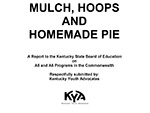 A Report to the Kentucky State Board of Education on A5 and A6 Programs in the Commonwealth.
A Report to the Kentucky State Board of Education on A5 and A6 Programs in the Commonwealth.
 Many Kentucky families face barriers when trying to access dental care, including lack of transportation to dental offices, lack of dental coverage, and a shortage of dental care providers in some areas. In this report, parents share experiences in obtaining dental health services for their children in communities across Kentucky.
Many Kentucky families face barriers when trying to access dental care, including lack of transportation to dental offices, lack of dental coverage, and a shortage of dental care providers in some areas. In this report, parents share experiences in obtaining dental health services for their children in communities across Kentucky.
Publications
 The 2022 Kentucky KIDS COUNT County Data Book features the latest data on 16 measures of child well-being, showing whether outcomes for children across the Commonwealth have improved, worsened, or stayed the same over a five-year period.
The 2022 Kentucky KIDS COUNT County Data Book features the latest data on 16 measures of child well-being, showing whether outcomes for children across the Commonwealth have improved, worsened, or stayed the same over a five-year period.
VIEW NOW
 The 31st edition of the Kentucky KIDS COUNT County Data Book features the latest data on 17 measures of child well-being, showing how outcomes for children across the commonwealth have changed over a five-year period. This data book focuses on advancing race equity, with an examination of racial disparities and the longstanding systemic barriers that contributed to them, alongside policy and practice solutions to address these disparities.
The 31st edition of the Kentucky KIDS COUNT County Data Book features the latest data on 17 measures of child well-being, showing how outcomes for children across the commonwealth have changed over a five-year period. This data book focuses on advancing race equity, with an examination of racial disparities and the longstanding systemic barriers that contributed to them, alongside policy and practice solutions to address these disparities.
VIEW NOW
 This issue brief highlights the prevalence of parental incarceration in Kentucky, the impact maternal incarceration has on children, and the state policy and practice changes that could hold parents accountable for their actions in ways that allow them to continue to care for their children and become successful contributors to society.
This issue brief highlights the prevalence of parental incarceration in Kentucky, the impact maternal incarceration has on children, and the state policy and practice changes that could hold parents accountable for their actions in ways that allow them to continue to care for their children and become successful contributors to society.
 The 30th edition of the Kentucky KIDS COUNT County Data Book features the latest data on 17 measures of child well-being, showing how outcomes for children across the commonwealth have changed over a five-year period. Though this data is not reflective of conditions during the COVID-19 crisis, it does indicate pre-existing barriers and areas of needed improvement. The opening essay examines the impacts of the dual pandemics of COVID-19 and systemic racial injustice on children and families with data disaggregated by race/ethnicity. VIEW NOW
The 30th edition of the Kentucky KIDS COUNT County Data Book features the latest data on 17 measures of child well-being, showing how outcomes for children across the commonwealth have changed over a five-year period. Though this data is not reflective of conditions during the COVID-19 crisis, it does indicate pre-existing barriers and areas of needed improvement. The opening essay examines the impacts of the dual pandemics of COVID-19 and systemic racial injustice on children and families with data disaggregated by race/ethnicity. VIEW NOW
 In A Kentucky Grandparent and Relative Caregiver Handbook, caregivers will find information on the basics of kinship care and the court process, tips for engaging with birth parents and navigating the complex child welfare system, and resources to help the vulnerable children in their care grow and thrive.
In A Kentucky Grandparent and Relative Caregiver Handbook, caregivers will find information on the basics of kinship care and the court process, tips for engaging with birth parents and navigating the complex child welfare system, and resources to help the vulnerable children in their care grow and thrive.
 The 2019 Kentucky KIDS COUNT County Data Book offers the latest data on 17 measures of child well-being, showing whether outcomes for children across the commonwealth have improved, worsened, or stayed the same over a five-year period. The opening essay explores how another undercount of young children in the 2020 census would negatively affect funding provided to our state and communities, reduce the reliability of data on child well-being, and could diminish political representation. VIEW NOW
The 2019 Kentucky KIDS COUNT County Data Book offers the latest data on 17 measures of child well-being, showing whether outcomes for children across the commonwealth have improved, worsened, or stayed the same over a five-year period. The opening essay explores how another undercount of young children in the 2020 census would negatively affect funding provided to our state and communities, reduce the reliability of data on child well-being, and could diminish political representation. VIEW NOW
 The 2018 County Data Book offers the latest data on 17 measures of child well-being, showing whether outcomes for children across the commonwealth have improved, worsened, or stayed the same over a five-year period. The opening essay takes a deep dive into the impact of trauma, specifically abuse and neglect, on children’s short- and long-term health and well-being. VIEW NOW
The 2018 County Data Book offers the latest data on 17 measures of child well-being, showing whether outcomes for children across the commonwealth have improved, worsened, or stayed the same over a five-year period. The opening essay takes a deep dive into the impact of trauma, specifically abuse and neglect, on children’s short- and long-term health and well-being. VIEW NOW
 Children need their parents to care for them and earn a living to meet their basic needs. Unfortunately, Kentucky has a high rate of children who have experienced separation from a parent due to incarceration, which impedes parents’ ability to stay employed and raise their kids. Through smart criminal justice policy changes, more Kentucky parents can be held accountable for their actions in ways that allow them to still care for their children. VIEW NOW
Children need their parents to care for them and earn a living to meet their basic needs. Unfortunately, Kentucky has a high rate of children who have experienced separation from a parent due to incarceration, which impedes parents’ ability to stay employed and raise their kids. Through smart criminal justice policy changes, more Kentucky parents can be held accountable for their actions in ways that allow them to still care for their children. VIEW NOW
 The 2017 County Data Book provides data on 17 measures of child well-being, showing whether outcomes for children have improved, worsened, or stayed the same over a five-year period. It also calculates how many children would be impacted if Kentucky was able to make just a 10 percent improvement for each measure.
The 2017 County Data Book provides data on 17 measures of child well-being, showing whether outcomes for children have improved, worsened, or stayed the same over a five-year period. It also calculates how many children would be impacted if Kentucky was able to make just a 10 percent improvement for each measure.
 All children deserve to breathe clean air and be healthy, yet approximately 69 percent of Kentucky’s children live in a community that does not offer them strong protections from secondhand tobacco smoke in workplaces and other enclosed public places. Clearing the Air for All Kentucky Children explains how smoke-free policies in workplaces and public places can protect babies, children, and teens. VIEW NOW
All children deserve to breathe clean air and be healthy, yet approximately 69 percent of Kentucky’s children live in a community that does not offer them strong protections from secondhand tobacco smoke in workplaces and other enclosed public places. Clearing the Air for All Kentucky Children explains how smoke-free policies in workplaces and public places can protect babies, children, and teens. VIEW NOW
 The 2014 County Data Book focuses on key state and county-level measures of child well-being. It opens with an essay on adverse childhood experiences and offers recommendations to prevent and help kids recover from these experiences so they can thrive as adults.
The 2014 County Data Book focuses on key state and county-level measures of child well-being. It opens with an essay on adverse childhood experiences and offers recommendations to prevent and help kids recover from these experiences so they can thrive as adults.
 Integrated care leads to better health outcomes for Kentucky’s children and their families. It addresses health care needs using a range of strategies and resources in a variety of settings, promoting increased access to care and to higher-quality care.
Integrated care leads to better health outcomes for Kentucky’s children and their families. It addresses health care needs using a range of strategies and resources in a variety of settings, promoting increased access to care and to higher-quality care.
 This report highlights the key role early childhood plays in lifetime success; outlines the critical components of strong early childhood experiences; reviews how Kentucky is working to provide young children a solid foundation; and identifies additional opportunities for Kentucky to provide every child from birth through age eight a chance to reach their full potential. VIEW NOW
This report highlights the key role early childhood plays in lifetime success; outlines the critical components of strong early childhood experiences; reviews how Kentucky is working to provide young children a solid foundation; and identifies additional opportunities for Kentucky to provide every child from birth through age eight a chance to reach their full potential. VIEW NOW
 The 2013 County Data Book focuses on key state and county-level measures of child well-being. It opens with an essay on how to create a Kentucky where all children succeed.
The 2013 County Data Book focuses on key state and county-level measures of child well-being. It opens with an essay on how to create a Kentucky where all children succeed.
 Kinship care is an extremely valuable alternative to traditional foster care that allows children to retain strong familial bonds when children cannot stay in their homes with their parents. This issue brief summarizes the findings of a series of focus groups, interviews, and surveys conducted with kinship caregivers and support providers and offers recommendations for increasing supports for kinship families. VIEW NOW
Kinship care is an extremely valuable alternative to traditional foster care that allows children to retain strong familial bonds when children cannot stay in their homes with their parents. This issue brief summarizes the findings of a series of focus groups, interviews, and surveys conducted with kinship caregivers and support providers and offers recommendations for increasing supports for kinship families. VIEW NOW
 The Jefferson County KIDS COUNT Data Book published in 2013 provides data on children in Metro Louisville at the Council District level. This micro level data can help neighborhoods in Louisville look at unique issues impacting children in various parts of the city.
The Jefferson County KIDS COUNT Data Book published in 2013 provides data on children in Metro Louisville at the Council District level. This micro level data can help neighborhoods in Louisville look at unique issues impacting children in various parts of the city.
 All children, especially those living in low-income and vulnerable families need access to affordable health care. Providing affordable health coverage for parents is one proven way to improve overall family health and reduce the number of uninsured children.
All children, especially those living in low-income and vulnerable families need access to affordable health care. Providing affordable health coverage for parents is one proven way to improve overall family health and reduce the number of uninsured children.
 The 2012 County Data Book focuses on key state, county, and district level measures of education. It opens with an essay on how to strengthen alternative education programs.
The 2012 County Data Book focuses on key state, county, and district level measures of education. It opens with an essay on how to strengthen alternative education programs.
Sharing School Facilities: How Collaboration Can Increase Physical Activity in Communities, May 2012
 Shared-use allows spaces such as gymnasiums, tracks, cafeterias, athletic fields and other school facilities to be used for recreation by community members of all ages. This report outlines the current landscape of shared-use agreements and explains the challenges and opportunities for opening more shared-use facilities in communities across Kentucky.
Shared-use allows spaces such as gymnasiums, tracks, cafeterias, athletic fields and other school facilities to be used for recreation by community members of all ages. This report outlines the current landscape of shared-use agreements and explains the challenges and opportunities for opening more shared-use facilities in communities across Kentucky.
 Youth incarcerated for status offenses, which are acts defined as illegal only because they are committed by people who are under 18 years of age, face greater risk of poor education, work, and health outcomes, as well as future incarceration. This issue brief provides data on youth incarceration for status offenses and provides recommendations for more efficient and effective alternatives to incarceration. VIEW NOW
Youth incarcerated for status offenses, which are acts defined as illegal only because they are committed by people who are under 18 years of age, face greater risk of poor education, work, and health outcomes, as well as future incarceration. This issue brief provides data on youth incarceration for status offenses and provides recommendations for more efficient and effective alternatives to incarceration. VIEW NOW
 The 2011 County Data Book focuses on key state and county-level measures of children’s health. It opens with an essay on how to improve the oral health of Kentucky families.
The 2011 County Data Book focuses on key state and county-level measures of children’s health. It opens with an essay on how to improve the oral health of Kentucky families.
 A learning environment that is safe and nurturing is necessary for all children to grow and thrive in school. For children in schools that use corporal punishment, or physical force, as a form of discipline, the classroom can become a threatening environment.
A learning environment that is safe and nurturing is necessary for all children to grow and thrive in school. For children in schools that use corporal punishment, or physical force, as a form of discipline, the classroom can become a threatening environment.
 While secure detention may be appropriate for violent offenses, it is rarely an appropriate or effective option for addressing status offenses, which are offenses that are illegal if committed by someone under age 18. The Reclaiming Futures model has been developed to identify the critical stages for implementing a successful plan for youth who have been or are at risk of being charged with a status offense. VIEW NOW
While secure detention may be appropriate for violent offenses, it is rarely an appropriate or effective option for addressing status offenses, which are offenses that are illegal if committed by someone under age 18. The Reclaiming Futures model has been developed to identify the critical stages for implementing a successful plan for youth who have been or are at risk of being charged with a status offense. VIEW NOW
 Complete streets are designed to accommodate everyone using the road, including pedestrians, bicyclists, motorists, and public transportation users of all ages and abilities. This issue brief explains how complete streets increase safety and improve health and makes recommendations for more Kentucky communities to incorporate complete streets.
Complete streets are designed to accommodate everyone using the road, including pedestrians, bicyclists, motorists, and public transportation users of all ages and abilities. This issue brief explains how complete streets increase safety and improve health and makes recommendations for more Kentucky communities to incorporate complete streets.
 A Picture of Health: A Report of Kentucky School Districts’ Health Services presents the findings of a study of school health services offered in Kentucky school districts during the 2008-2009 school year and offers highlights of promising practices across the state. Study topics included school health services funding, school health services offered, and types of school health providers. VIEW NOW
A Picture of Health: A Report of Kentucky School Districts’ Health Services presents the findings of a study of school health services offered in Kentucky school districts during the 2008-2009 school year and offers highlights of promising practices across the state. Study topics included school health services funding, school health services offered, and types of school health providers. VIEW NOW
 All young people need a strong education to succeed in today’s economy, and graduating from high school is more critical than ever before. Failing to graduate high school has long-term negative consequences for the individual and for society. This brief focuses on prevention of high school dropout and strategies for improving the state’s high school graduation rate. VIEW NOW
All young people need a strong education to succeed in today’s economy, and graduating from high school is more critical than ever before. Failing to graduate high school has long-term negative consequences for the individual and for society. This brief focuses on prevention of high school dropout and strategies for improving the state’s high school graduation rate. VIEW NOW
 The 2010 County Data Book focuses on key state and county-level measures of economic well-being. It opens with an essay on how to increase access to work supports for Kentucky families.
The 2010 County Data Book focuses on key state and county-level measures of economic well-being. It opens with an essay on how to increase access to work supports for Kentucky families.
 All children need a safe environment and caring adults to thrive. This brief focuses on prevention of out-of-home placement for children who have been abused by ensuring that family preservation services and family reunification services are available.
All children need a safe environment and caring adults to thrive. This brief focuses on prevention of out-of-home placement for children who have been abused by ensuring that family preservation services and family reunification services are available.
 The 2009 County Data Book focuses on key state and county level measures of safety. It opens with an essay on the need for better collaboration between the juvenile justice and child welfare systems.
The 2009 County Data Book focuses on key state and county level measures of safety. It opens with an essay on the need for better collaboration between the juvenile justice and child welfare systems.
 Though unintentional, the system of juvenile justice results in different vulnerabilities, treatment, and outcomes for youth of color compared to white youth, even when they have engaged in the very same behaviors. This issue brief includes data that shows that youth of color are clearly over represented at some of the key decision-making points within Kentucky’s juvenile justice system and provides recommendations for eliminating these disparities. VIEW NOW
Though unintentional, the system of juvenile justice results in different vulnerabilities, treatment, and outcomes for youth of color compared to white youth, even when they have engaged in the very same behaviors. This issue brief includes data that shows that youth of color are clearly over represented at some of the key decision-making points within Kentucky’s juvenile justice system and provides recommendations for eliminating these disparities. VIEW NOW
 All families need reasonably-priced financial services to pay bills and provide for their families. Yet, low-income families in Kentucky often pay higher prices than higher-income families for basic financial services, such as cashing a check or taking out a small loan. This report presents information that was shared by low-income working families across the state about their financial situations and use of financial products, specifically payday loans. VIEW NOW
All families need reasonably-priced financial services to pay bills and provide for their families. Yet, low-income families in Kentucky often pay higher prices than higher-income families for basic financial services, such as cashing a check or taking out a small loan. This report presents information that was shared by low-income working families across the state about their financial situations and use of financial products, specifically payday loans. VIEW NOW
 The 2008 County Data Book includes key state, county, and district level measures of education, economic well-being, health and safety. It opens with an essay on the influence of three factors on the lives of Kentucky children: place, income and race.
The 2008 County Data Book includes key state, county, and district level measures of education, economic well-being, health and safety. It opens with an essay on the influence of three factors on the lives of Kentucky children: place, income and race.
 All families need a steady, stable income to meet basic needs and support their children’s healthy development, yet many Kentucky families struggle to make it until their next payday. Some families rely on short-term payday loans to make ends meet, but working Kentuckians lose millions of dollars annually in fees paid for these loans. This report details the higher costs low-income families pay for goods and services. VIEW NOW
All families need a steady, stable income to meet basic needs and support their children’s healthy development, yet many Kentucky families struggle to make it until their next payday. Some families rely on short-term payday loans to make ends meet, but working Kentuckians lose millions of dollars annually in fees paid for these loans. This report details the higher costs low-income families pay for goods and services. VIEW NOW
 The 2007 County Data Book includes key state, county, and district level measures of education, economic well-being, health and safety. It opens with an essay on the importance of using data to improve the lives of children in Kentucky.
The 2007 County Data Book includes key state, county, and district level measures of education, economic well-being, health and safety. It opens with an essay on the importance of using data to improve the lives of children in Kentucky.
 Lower-income families in Kentucky often pay hundreds, sometimes thousands, of dollars more in higher prices for basic necessities than their higher-income neighbors. Although not a new problem, the costs today are much greater in scope. This report examines the prices charged to lower-income families in Kentucky for basic necessities: financial services, auto-related products, home financing and household goods, and groceries. VIEW NOW
Lower-income families in Kentucky often pay hundreds, sometimes thousands, of dollars more in higher prices for basic necessities than their higher-income neighbors. Although not a new problem, the costs today are much greater in scope. This report examines the prices charged to lower-income families in Kentucky for basic necessities: financial services, auto-related products, home financing and household goods, and groceries. VIEW NOW
 To better understand how the “high cost of being poor” is affecting local families, Kentucky Youth Advocates conducted in-depth interviews and focus groups throughout the Commonwealth. In this report, KYA focused on how families manage the costs of basic goods and services, and what they think is needed to help bring down these costs.
To better understand how the “high cost of being poor” is affecting local families, Kentucky Youth Advocates conducted in-depth interviews and focus groups throughout the Commonwealth. In this report, KYA focused on how families manage the costs of basic goods and services, and what they think is needed to help bring down these costs.
 Bullying can result in substantial long-term negative impacts for the victim, the bully, the school’s learning environment, and society as a whole. This issue brief presents findings about bullying in Kentucky and offers recommendations for effectively responding to and preventing bullying.
Bullying can result in substantial long-term negative impacts for the victim, the bully, the school’s learning environment, and society as a whole. This issue brief presents findings about bullying in Kentucky and offers recommendations for effectively responding to and preventing bullying.
 A Report to the Kentucky State Board of Education on A5 and A6 Programs in the Commonwealth.
A Report to the Kentucky State Board of Education on A5 and A6 Programs in the Commonwealth.
 Many Kentucky families face barriers when trying to access dental care, including lack of transportation to dental offices, lack of dental coverage, and a shortage of dental care providers in some areas. In this report, parents share experiences in obtaining dental health services for their children in communities across Kentucky.
Many Kentucky families face barriers when trying to access dental care, including lack of transportation to dental offices, lack of dental coverage, and a shortage of dental care providers in some areas. In this report, parents share experiences in obtaining dental health services for their children in communities across Kentucky.


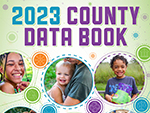

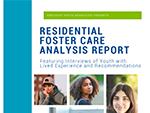


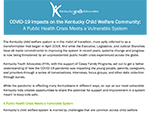

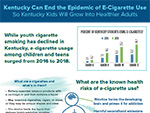














 The infographic displays fun facts about oral health and the consequences of poor oral hygiene. It also looks at what barriers Kentuckians face when it comes to having optimal oral health including cost, lack of prevention, and lack of access.
The infographic displays fun facts about oral health and the consequences of poor oral hygiene. It also looks at what barriers Kentuckians face when it comes to having optimal oral health including cost, lack of prevention, and lack of access.